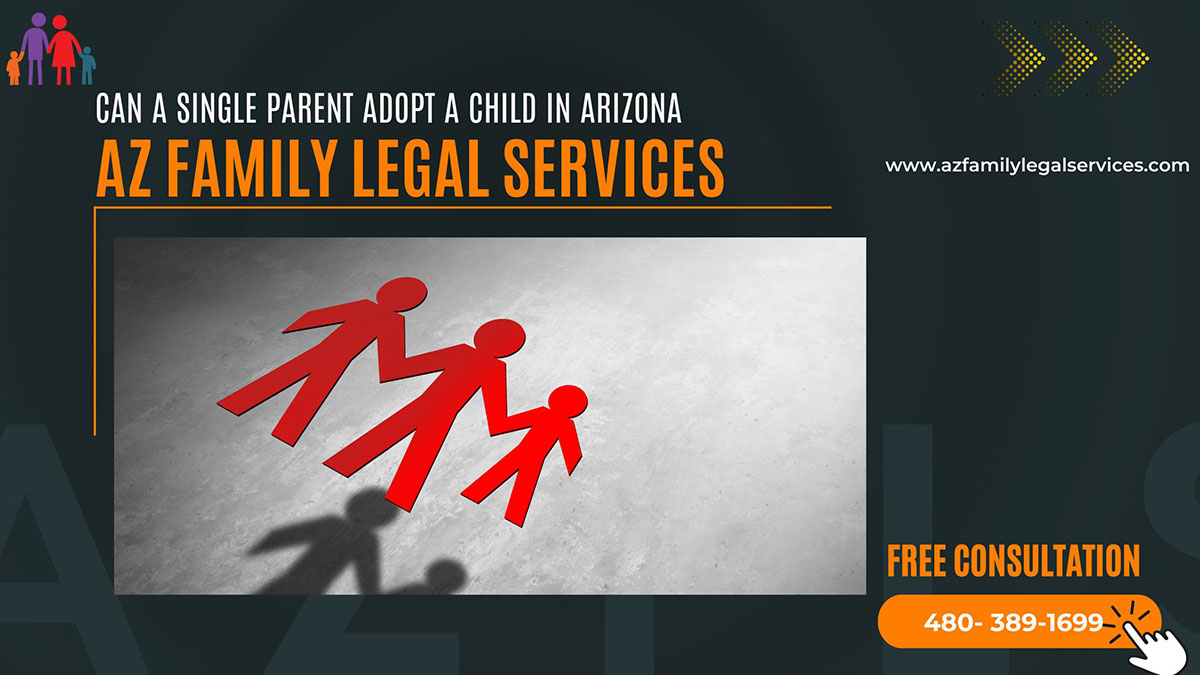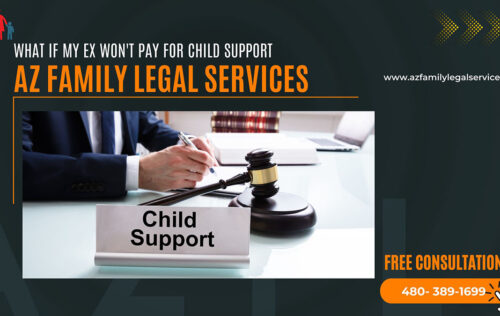Can a Single Parent Adopt a Child in Arizona

According to Child Welfare Information Gateway, more than a quarter of all Adoptions from Foster care were by single people in 2017. With a population that reflects various family structures, including single-parent households, it’s crucial to understand the legal landscape surrounding adoption in Arizona, particularly for individuals navigating the journey of single parenthood and seeking to expand their families through adoption.
If you require legal aid regarding family matters such as adoption, reach out to AZ Family Legal Services at (480) 389-1699, situated in Phoenix, Arizona. Our committed Family Lawyer Team can guide you through difficult circumstances, ensuring your rights and concerns are expertly handled.
Why is Single-Parent Adoption Becoming More Common?
Single-Parent Adoption has been gaining popularity in Arizona for several reasons:
Changing Social Norms: Society’s attitudes toward single parenthood have evolved, with more acceptance and recognition of single individuals as capable parents. This societal shift has led to a greater number of single individuals considering and pursuing adoption.
Decreasing Stigma: There’s been a reduction in the stigma associated with single parenthood. Single individuals are now more empowered to build families through Adoption without fear of judgment or discrimination.
Increased Support: Single parents today have access to a wider range of support networks and resources. These may include support groups, online communities, and government assistance programs designed to help single parents navigate the challenges of raising children.
More Flexible Adoption Policies: Adoption Agencies and organizations in Arizona have become more open to working with single individuals, recognizing their ability to provide stable and loving homes for children in need of adoption. This shift in policy has made the adoption process more accessible to single parents.
Desire for Parenthood: Many single individuals have a strong desire to become parents and are choosing adoption to fulfill this dream. Whether through personal choice, circumstances, or infertility, adoption provides a meaningful path to parenthood for single individuals.
Changing Family Dynamics: Traditional family structures are evolving, and the definition of family has expanded to include diverse configurations. As a result, more single individuals feel empowered to pursue adoption to create a family on their own terms.
Legal Considerations for Single Parents
When considering Adoption as a Single Parent in Arizona, several legal aspects come into play. Understanding these considerations can streamline the adoption process and ensure compliance with the state’s legal requirements. Here are some key points to consider:
Legal Capacity and Financial Stability
Single Individuals seeking to adopt a child must demonstrate their legal capacity and financial stability to provide a nurturing and stable environment for the Child. This includes having a steady income to meet the child’s needs, access to suitable housing, and the ability to provide for their health, education, and overall well-being. Prospective adoptive parents may be required to provide financial documentation and undergo a financial assessment to verify their capacity to Support a Child.
Home Study Evaluation
As part of the Adoption Process, Single parents are typically required to undergo a comprehensive home study evaluation conducted by a licensed social worker or adoption agency. This evaluation involves a thorough assessment of various aspects of the prospective parent’s life, including their personal background, lifestyle, living conditions, parenting skills, and motivation for Adoption. The purpose of the home study is to ensure that the adoptive parent is emotionally, mentally, and physically prepared to provide a safe, nurturing, and stable environment for the child.
Does Your Gender Matters in Adoption?
Influence of Prior Legal History
Legal Capacity and Background Checks
Impact of Criminal History on Adoption
The impact of a previous Criminal Case on an individual’s eligibility to adopt depends on various factors, including the type of offense, the time elapsed since the conviction or completion of the sentence, and evidence of rehabilitation. In cases where the offense poses a risk to the safety and well-being of a child, such as crimes involving violence, abuse, or neglect, it may significantly impact the adoption process.
Consideration of Rehabilitation and Character
In assessing the suitability of prospective adoptive parents with a Criminal History, Adoption agencies and courts often consider evidence of rehabilitation and character. Factors such as remorse, accountability, efforts at rehabilitation, and positive life changes following the offense may weigh favorably in the decision-making process. Demonstrating a commitment to personal growth, stability, and the best interests of the child can strengthen the case for adoption despite past indiscretions.
Benefits of Adoption for Single Parents
While the decision to adopt as a single parent may come with its challenges, it also offers numerous rewards and benefits. Here are some compelling reasons why single individuals may choose to pursue adoption in Arizona:
Fulfilling Parenthood Dreams
For many single individuals, adoption represents a pathway to fulfilling their dreams of parenthood. Regardless of marital status, the love and bond between a parent and child are profound and enduring, enriching both their lives in meaningful ways.
Providing a Loving Home
Single parents can provide a loving and stable home environment for a child in need. By opening their hearts and homes to adoption, single individuals can make a positive difference in a child’s life, offering them the security, care, and support they deserve.
Building Strong Family Bonds
Adopting a child as a single parent can foster strong family bonds and relationships. Through love, nurture, and guidance, single parents can create lasting connections with their adopted children, forging a family unit built on love, respect, and mutual support.
Conclusion
Legal Representation
Seeking Support from AZ Family Legal Services
At AZ Family Legal Services, we understand the complexities of adoption law in Arizona and are committed to helping single parents navigate the adoption process with confidence and peace of mind. Our team of experienced adoption attorneys provides compassionate legal guidance and support every step of the way, ensuring that your adoption journey is smooth, successful, and fulfilling.
Whether you’re considering adoption as a single parent or have already embarked on the adoption journey, our dedicated team is here to assist you. With our extensive knowledge of Arizona adoption laws and our unwavering commitment to client satisfaction, we strive to make the adoption process as seamless and stress-free as possible.
Contact Us Today
Frequently Asked Questions (FAQs)
Can single individuals adopt a child in Arizona?
Yes, single individuals have the legal right to adopt a child in Arizona. The state recognizes the ability of single parents to provide a loving and stable home environment for children in need of adoption.
What is a home study evaluation, and why is it required?
A home study evaluation is a comprehensive assessment conducted by a licensed social worker or adoption agency to evaluate the prospective parent’s suitability for adoption. It includes an examination of the home environment, personal background, parenting skills, and motivation for adoption. The purpose is to ensure that the adoptive parent can provide a safe and nurturing environment for the child.
Are there age requirements for single parents looking to adopt?
While there are no specific age requirements for single parents, adoption agencies and courts may consider the prospective parent’s age in relation to their ability to care for a child. The primary concern is the parent’s ability to meet the child’s needs throughout their upbringing.
How long does the adoption process typically take for single parents?
The adoption process timeline can vary depending on various factors, including the type of adoption, the child’s age and background, and legal requirements. On average, the process may take several months to a year or more to complete.
What financial considerations should single parents be aware of during the adoption process?
Single parents should be prepared for various financial expenses associated with adoption, including agency fees, legal fees, home study costs, and potential travel expenses. It’s essential to budget accordingly and explore available resources, such as adoption grants and subsidies.
Can single parents choose the gender of the child they wish to adopt?
In most cases, single parents can express their preferences regarding the gender of the child they wish to adopt. However, the availability of children for adoption may vary, and prospective parents may need to remain open to children of all genders.
Are there resources available to support single parents throughout the adoption process?
Yes, several resources are available to support single parents throughout the adoption journey, including adoption agencies, support groups, online forums, and legal services. These resources can provide guidance, information, and emotional support to prospective adoptive parents.
What rights do single parents have during the adoption process?
Single parents have the same legal rights as married couples during the adoption process. These rights include the right to be informed about the adoption process, participate in decision-making regarding the child’s placement, and provide consent for the adoption.
Can single parents adopt internationally in Arizona?
Yes, single parents in Arizona have the option to pursue international adoption. However, the process may involve additional legal requirements, including compliance with the adoption laws of the child’s country of origin and adherence to international adoption treaties.
What happens after the adoption is finalized for single parents?
After the adoption is finalized, single parents assume full legal responsibility for the child, including providing for their care, upbringing, and well-being. The child becomes a permanent member of the family, and the adoptive parent’s rights and responsibilities are legally recognized.



